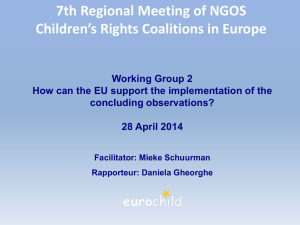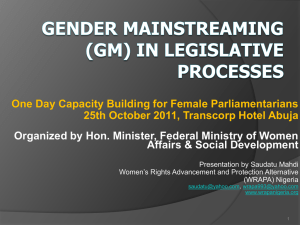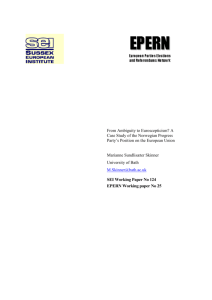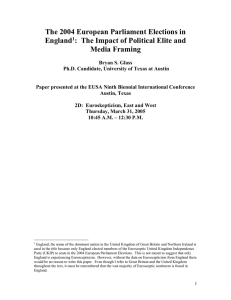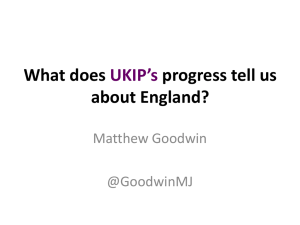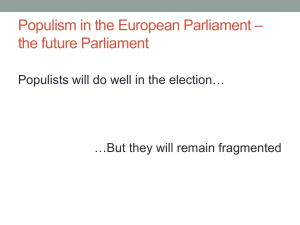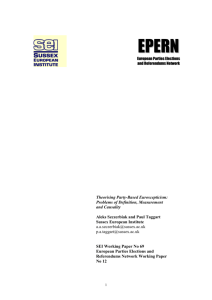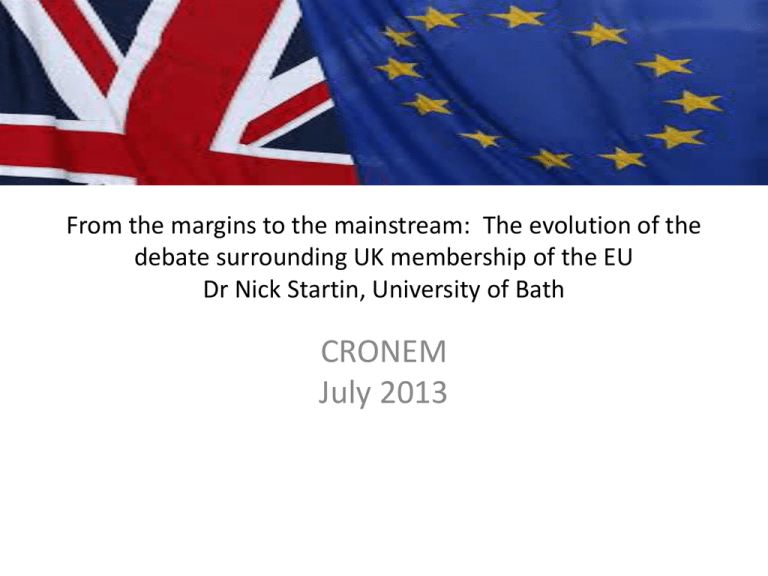
From the margins to the mainstream: The evolution of the
debate surrounding UK membership of the EU
Dr Nick Startin, University of Bath
CRONEM
July 2013
The focus of the presentation
• UK Euroscepticism: from the margins to the
mainstream – an intro to the debate
• UK Euroscepticism: The historical perspective
• The mainstreaming of UK Euroscepticism: the
UK “troika” – public opinion, parties and
media
• The mainstreaming of UK Euroscepticism:
some concluding thoughts
UK Euroscepticism: from the margins to
the mainstream – an intro to the debate
UK Euroscepticism: from the margins to
the mainstream – an intro to the debate
• “Britain's departure from the EU grows ever more
likely. David Cameron, the prime minister, wants
Britain to stay in. But he seems set on a path that
could lead to an exit. British withdrawal requires
two conditions to be satisfied. First, the
government of the day must call a referendum on
whether to leave the EU. Second, a majority of
voters must want to quit. The first condition
seems likely to be met, and the second is, for
now, fulfilled”
• Grant, C. (2012) ‘How Britain could leave the
EU?’, Centre for European Reform Essay
http://www.cer.org.uk/publications/archive/bulleti
n-article/2012/how-britain-could-leave-eu
UK Euroscepticism:
The historical perspective
UK Euroscepticism:
The historical perspective
• ‘Euroscepticism initially
appeared as a
distinctively English
phenomenon….’
• Harmsen, R. & Spiering,
M. (eds.) (2004)
Euroscepticism: Party
Politics, National
Identity and European
Integration, p.13
UK Euroscepticism:
The historical perspective
Why is the UK sceptical of the EU? Some common held
historical interpretations
• 1) The English channel as a physical and psychological
barrier
• 2) The language barrier
• 3) The Special Relationship with the USA
• 4) A history of empire and commonwealth
• 5) Britain's Second World War experience
• 6) Britain historically a world power
For clear account of historical perspective of UK
euroscepticism see: Grant, C. (2007) ‘Why is Britain
Eurosceptic?, Centre for European Reform Essay
http://www.cer.org.uk/publications/archive/essay/2008/whybritain-eurosceptic
The mainstreaming of UK Euroscepticism: the
UK “troika” – public opinion, parties and media
The
Media
The
Mainstreaming
of
Euroscepticism
Parties
Public
Opinion
The mainstreaming of Euroscepticsim
in the UK: Public Opinion (EB78: 2013)
The mainstreaming of Euroscepticsim
in the UK: Public Opinion (EB78: 2013)
The mainstreaming of Euroscepticsim
in the UK: The role of parties
• "we must address perhaps the most perplexing aspect of
British Euroscepticism. How are we to account both for the
persistently high levels of Euroscepticism in the British
party system and the oscillating commitments of the two
major political parties to Euroscepticism?"
• Baker et al. (2008) “Euroscepticism in the British Party
System: A Source of Fascination, Perplexity, and Sometimes
Frustration”, in Opposing Europe? The Comparative Party
Politics of Euroscepticism Volume 1: Case Studies and
Country Surveys. Ed. Taggart, Paul and Aleks Szczerbiak.
Oxford: Oxford University Press, 2008. 93-116.
The mainstreaming of Euroscepticsim in the
UK: The role of parties (The Conservative Party)
• Amongst the Conservative parliamentary rump as
of 2010 – an estimated 100 or so ‘withdrawalists’
• Europhilia: "the love that dare not speak its
name” on Conservative backbenches (Boffey
2013)
• Conservative party’s decision to leave the
European People’s Party in the EP and to initiate
the European Conservatives and Reformists
group in 2009
Number of Conservative MPs in House of
Commons rebelling in EU related votes
Year
Number
1992 (Maastricht Treaty)
26
2011 (Motion to grant
81
referendum on EU
Membership)
2013 (Motion to “regret” 114
EU ref not part of Queen’s
speech)
The mainstreaming of Euroscepticsim in the UK: The
role of parties (Labour and Liberal Democrats)
• The Labour party uncertain about how to
respond to the ‘referendum trap’
• ‘Even Liberal parties like the UK Liberal
Democrats…….have in recent years been
forced to rein in their euro-enthusiasm when
faced with the realities of coalition
government and the need to juggle a range of
disparate public opinion’
Source: Usherwood & Startin (2013:13)
The mainstreaming of Euroscepticsim
in the UK: The rise of UKIP
Re: the 2013 May local elections:
‘Biggest surge by a fourth party
in England since the second world
war, UKIP averaged 25% of the
vote in council wards where it
stood’
Source: Watt, N. (2013) ‘Ukip will
change face of British politics like
SDP, says Nigel Farage’
http://www.guardian.co.uk/politi
cs/2013/may/03/nigel-farageukip-change-british-politics
The mainstreaming of Euroscepticsim
in the UK: The rise of UKIP
The mainstreaming of Euroscepticsim
in the UK: The rise of UKIP
• 'A Bunch Of Fruitcakes,
Loonies And Closet
Racists‘ (David Cameron
2006 LBC breakfast
show)
• ‘A collection of clowns…
indignant, angry people’
(Ken Clarke, April 2013)
The mainstreaming of Euroscepticsim
in the UK: The rise of UKIP
• ‘Nigel Farage is a
rather engaging
geezer‘ (Boris
Johnson, April 2013)
• 'Tories must dump
Clegg and get into
bed with UKIP‘
(Nadine Dorres, May
2013)
The mainstreaming of Euroscepticsim
in the UK: The rise of UKIP
• European Elections
2014? - 27% according
to Open Europe/Com
Res survey (May 2013)
• General Election 2015?
- 20% according to
Open Europe/Com Res
survey (May 2013)
UKIP at the ballot box in by-elections
(Source: Channel 4.com)
The mainstreaming of Euroscepticsim
in the UK: The rise of UKIP
Some key short term triggers:
• The UKIP adoption scandal in
Rotherham (Nov 2012)
• The announcement of a
referendum on EU membership
by Cameron (Jan 2013)
• Farage and Murdoch’s meeting
(March 2013)
• Proposed Cypriot raid on
personal bacnk accounts to pay
for austerity (March 2013)
• Farage: ministers ‘picking a war
with middle England’ folllowing
MPs vote to legalise same sex
marriage (May 2013)
The mainstreaming of Euroscepticsim
in the UK: The role of the media
‘The current modus operandi of much of the Londonbased Eurosceptic press is a serious problem for UK
democracy for which no effective voluntary or
compulsory regulatory solution seems seriously to be on
the table as far as policy makers are concerned’
Source: Andersen, P. ‘ A Flag of convenience: Discourse
and Motivations of the London Based Eurosceptic Press’
in Harmsen, R. & Spiring (ed.) (2004) Euroscepticism,
Party Politics, National Identity and European Integration
The mainstreaming of Euroscepticsim
in the UK: The role of the media
The mainstreaming of Euroscepticsim
in the UK: The role of the media
Euroscepticism in the UK: The Media
• 373,000 petition leads
to parliamentary vote
in the House of
Commons in October
2011
http://www.haveyoursay.e
u/register.html
http://www.bbc.co.uk/ne
ws/uk-politics15425256
The mainstreaming of Euroscepticsim
in the UK: The role of the media
The mainstreaming of Euroscepticsim
in the UK: The role of the media
• Progress at the ballot box for ‘populist niche’
parties like UKIP is more likely with the
combination of a national media:
• 1) where the issues that the party espouses
are covered extensively
• 2) which provides positive exposure of the
leader in question and thus legitimises this
leader
The mainstreaming of Euroscepticsim
in the UK: The role of the media
‘The lack of a ‘level playing-field’ in terms of EU coverage
amongst the British press has left the UK open to accusations
that its citizens are unable to weigh up the ‘costs’ and
‘benefits’ of membership of the Union in a rational and
informed fashion’
Source: Startin, N. (2013) ‘Have we reached a tipping-point?
An analysis of UK press portrayals of the EU’, paper at
forthcoming UACES annual Conference (Leeds): September
See EU site ‘Myths and Rumours de-bunked’:
http://ec.europa.eu/dgs/communication/take_part/myths_en
.htm
Media
Public
Parties
Opinion
Mainstreaming of Euroscepticism
EU ‘In/Out’ Referendum
UK exit EU?
The mainstreaming of UK Euroscepticism:
some concluding thoughts
• "The ratchet-effect of Euroscepticism has now gone so
far that the Conservative leadership is in effect running
scared of its own backbenchers, let alone Ukip, having
allowed deep anti-Europeanism to infect the very soul
of the party’’ (Geoffrey Howe 2013)
• “The risk now is that, if it loses the next general
election – a far from negligible possibility – the
Conservative party will move to a position of simply
opposing Britain's continued membership, with or
without a referendum” (Geoffrey Howe 2013)
The mainstreaming of UK Euroscepticism: some
concluding thoughts (Yougov May 2013)
Bibliography
•
•
•
•
•
•
•
•
•
Baker et al. (2008) “Euroscepticism in the British Party System: A Source of Fascination, Perplexity,
and Sometimes Frustration”, in Taggarty, P. & Szczerbiak, A. (Eds.) Opposing Europe? The
Comparative Party Politics of Euroscepticism Volume 1: Case Studies and Country Surveys, Oxford
University Press, 2008. 93-116.
George, S. (1998) An Awkward Partner: Britain in the European Community, Third Edition: Oxford
University Press.
Boffey, D (2013) ‘Out, out, out! Can anybody stem the Eurosceptic tide?’
http://www.guardian.co.uk/politics/2013/may/18/eurosceptic-conservative-party
Grant, C. (2007) ‘Why is Britain Eurosceptic?, Centre for European Reform Essay
http://www.cer.org.uk/publications/archive/essay/2008/why-britain-eurosceptic
Grant, C. (2012) ‘How Britain could leave the EU?, Centre for European Reform Essay’
http://www.cer.org.uk/publications/archive/bulletin-article/2012/how-britain-could-leave-eu
Harmsen, R. & Spiering, M. (eds.) (2004) Euroscepticism: Party Politics, National Identity and
European Integration, Rodopi: Amsterdam
Startin, N. (2013) ‘Have we reached a tipping-point? An analysis of UK press portrayals of the EU’,
paper at forthcoming UACES annual Conference (Leeds): September
Usherwood, S. & Startin, N. (2013) ‘Euroscepticism as a Persistent Phenomeon’, Journal of Common
Market Studies, 51: 1
Watt, N. (2013) ‘Ukip will change face of British politics like SDP, says Nigel Farage’
http://www.guardian.co.uk/politics/2013/may/03/nigel-farage-ukip-change-british-politics


